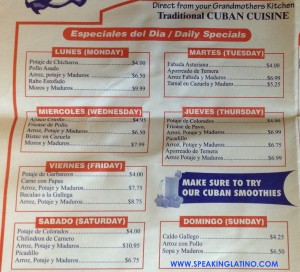A derogatory term used in Spanish to refer to someone who is ignorant or lacks education. It is a combination of 'analfabeto' meaning illiterate and 'burro' meaning donkey, which is often used to refer to someone as stupid. Examples Spanish: No seas un analfaburro, debes leer más libros. English: Don't be an analfaburro, you should […]
andancio
A term used to signify a widespread disease or illness during a specific period, often a seasonal flu or cold. It can be used more broadly to refer to a trend or something that is currently popular or widespread. Examples Spanish: Hay un andancio de gripe en la ciudad. Todos parecen estar enfermos. English: There's […]
antier
A colloquial term used in certain regions to refer to the day before yesterday. Examples Spanish: Antier estuve en la fiesta de Juan. English: I was at Juan's party the day before yesterday.
apearse
A Spanish slang term that means to get off or to dismount, commonly used in reference to getting off a vehicle or stopping doing something. Examples Spanish: Voy a apearme del autobús en la próxima parada. English: I am going to get off the bus at the next stop.
apencarse
A Spanish slang term primarily used in Spain, 'apencarse' means to feel down, upset or to be in a bad mood. Examples Spanish: No te apences por eso, todo se solucionará pronto. English: Don't feel down about that, everything will be resolved soon.
apendejarse
To act foolishly or lose one's common sense, often due to being in love or being overly emotional. Examples Spanish: Cuando Juan se enamoró de Maria, empezó a apendejarse y olvidó todas sus responsabilidades. English: When Juan fell in love with Maria, he began to act foolishly and forgot all his responsibilities.
absorbente
In Spanish slang, 'absorbente' refers to a person who is overbearing or excessively controlling, demanding a lot of attention or time. Examples Spanish: No puedo salir con Juan, es muy absorbente y no me deja hacer nada por mi cuenta. English: I can't date Juan, he's very overbearing and won't let me do anything on […]
achantado
A term used to describe someone who is calm, relaxed, or laid-back. Examples Spanish: Juan siempre está achantado, nunca se preocupa por nada. English: Juan is always laid-back, he never worries about anything.
aché
A term rooted in Afro-Cuban culture, often used to express good luck, positive energy, or blessings. Examples Spanish: Te deseo mucho aché para tu nuevo negocio. English: I wish you a lot of aché for your new business.
acojonado
A colloquial Spanish term used to express fear, shock, or awe. It's equivalent to 'scared' or 'terrified' in English. Examples Spanish: Estoy acojonado de hacer el salto en paracaídas. English: I'm terrified to do the parachute jump.
acojonante
A Spanish slang term used to describe something that is amazing, astonishing, or intimidating. Examples Spanish: ¡El concierto de anoche fue acojonante! English: The concert last night was astonishing!
acoquinado
A term used to express fear, nervousness or anxiety. It's often used to describe someone who is scared or intimidated. Examples Spanish: No puedo saltar desde aquí, estoy muy acoquinado. English: I can't jump from here, I'm very scared.
acotejar
A Spanish slang term primarily used in Mexico, which means to confirm or verify something. Examples Spanish: Voy a acotejar si Juan tiene la razón sobre el horario del cine. English: I'm going to verify if Juan is right about the movie schedule.
aguaje
Aguaje is a Peruvian slang term which refers to a person pretending to be something they are not or giving a false impression. It can also refer to a person who likes to show off. Examples Spanish: No seas aguajero, todos sabemos que no tienes ese dinero. English: Don't be a show-off, we all know […]
alabao
An expression of surprise, disbelief, or amazement, predominantly used in Cuba. Examples Spanish: 'Alabao', ¡qué calor hace hoy! English: 'Alabao', it's so hot today!
The Most Authentic Word in Cuban Spanish: ASERE
Every country has a flag, food and symbols that identify them. But what about a single word? During the 6th International Congress of the Spanish Language (VI Congreso Internacional de la Lengua Española) celebrated in Panama, the blog Papeles Perdidos, created by the newspaper El País, published an atlas of the representative words of Spanish-speaking […]
Decoding a Cuban Menu: 14 Cuban Spanish Food Words And Dishes
Some time ago, Jared and I took a food tour in Little Havana, Miami. The experience was great because we were able to taste the wonderful Cuban food and learn about the history of Little Havana. Since I’m Puerto Rican I knew I was going to find many similar ingredients, such as the plantain, the […]
guanajo
A humorous or derogatory term used in several Spanish-speaking countries, such as Cuba, to refer to a person. It can range from meaning a fool or stupid person to a term of endearment among friends, depending on context. Examples Spanish: No seas guanajo, eso no es verdad. English: Don't be a fool, that's not true.
raspa
In Mexican slang, 'raspa' refers to a snow cone or shaved ice with flavored syrup. It can also refer to a scrape or scratch, depending on the context. Examples Spanish: 1. Cuando hace calor, me encanta comer una raspa de limón. 2. Me caí y me hice una raspa en la rodilla. English: 1. When […]
perilla
In Spanish slang, 'perilla' refers to a goatee or a small beard concentrated around the mouth and chin, not including the cheeks. Examples Spanish: Mi amigo decidió dejarse crecer una perilla para cambiar su apariencia. English: My friend decided to grow a goatee to change his appearance.

